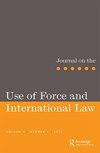The doctrine of ‘negative equality’ and the silent majority of states
Q3 Social Sciences
Journal on the Use of Force and International Law
Pub Date : 2021-01-02
DOI:10.1080/20531702.2021.1918383
引用次数: 1
Abstract
ABSTRACT Critics of the so-called negative equality doctrine, which prohibits third-state military intervention upon invitation by a government embroiled in civil war, point to recent contravening practice together with a generally passive or politically supportive attitude by states to substantiate their views. If, however, a prohibition indeed remains the starting point under the lex lata, that critical view largely depends on the legal transformation of state silence into acquiescence. This article contests such a transformation based on the accepted conditions for acquiescence to arise, concerns which are confirmed by two case studies on interventions in the Libyan and Yemeni civil wars. As a result, states’ inaction to controversial military operations rarely qualifies as ‘negative opinio juris’. Indeed, the erosion of customary international norms, especially those that regulate sending troops to war, surely requires more than a few deviant states and a regrettable but legally inconsequential apathy by the international community.“消极平等”的教义和沉默的大多数国家
所谓的消极平等原则禁止第三国应卷入内战的政府的邀请进行军事干预,批评者指出,最近的违反实践以及各国普遍消极或政治支持的态度来证实他们的观点。然而,如果禁令确实仍然是现行法的起点,那么这种批判观点在很大程度上取决于国家沉默向默许的法律转变。本文基于默许的公认条件对这种转变提出了质疑,这一担忧在利比亚和也门内战干预的两个案例研究中得到了证实。因此,国家对有争议的军事行动的不作为很少被称为“消极的法律意见”。的确,国际惯例,特别是那些规范派兵参战的惯例,要受到侵蚀,需要的肯定不仅仅是几个离经叛道的国家,以及国际社会令人遗憾但在法律上无关紧要的冷漠。
本文章由计算机程序翻译,如有差异,请以英文原文为准。
求助全文
约1分钟内获得全文
求助全文
来源期刊

Journal on the Use of Force and International Law
Social Sciences-Law
CiteScore
1.10
自引率
0.00%
发文量
13
 求助内容:
求助内容: 应助结果提醒方式:
应助结果提醒方式:


